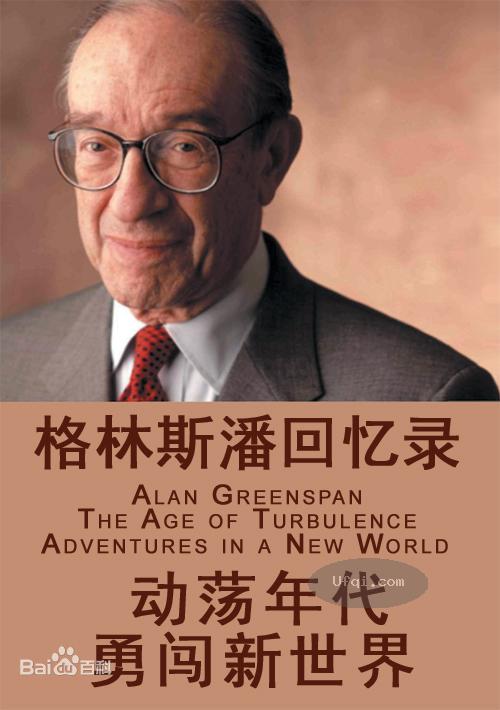


2023-05-18 , 8792 , 104 , 246
美联储主席艾伦格林斯潘回忆录--动荡年代:勇闯新世界-the age of turbulence-46
We'd seen that sort of disaster happen in Japan, where the economy was still crippled from a stock and real estate collapse in 1990.
While neither Bob nor I thought the United States had yet reached the bubble stage, we couldn't help but notice that more and more households and businesses
were exposing themselves to equity risks.
So over breakfast we often discussed what we should do in the event of a bubble.
Bob thought that a federal financial official should never talk about the stock market in public.
An inveterate maker of lists, he offered three reasons noted subsequently in his memoirs.
"First, there's no way to know for certain when a market is overvalued or undervalued," he said.
"Second, you can't fight market forces, so talking about it won't do any good.
And third, anything you say is likely to backfire and hurt your credibility. People will
realize you don't know any more than anybody else."
I had to admit that all of those things were true.
But I still didn't agree that raising the issue in public was necessarily a bad idea. The growing importance of the stock market was impossible to deny. How could you talk about the economy without mentioning the eight-hundred-pound gorilla?
While the Fed had no explicit mandate to focus on the stock market, the effects of the run-up in prices seemed to me a legitimate concern.
In quelling inflation, we had established that price stability is central to long-term economic growth. (In fact, one major factor causing stock prices to rise was investors' growing confidence that stability would continue.)
Yet the concept of price stability wasn't as self-evident as it seemed.
There were probably ten different statistical series on prices you could look at.
For most economists, price stability referred to product prices—the cost of a pair of socks or a quart of milk. But what about the prices of income-earning assets, like stocks or real estate?
What if those prices were to inflate and become unstable? Shouldn't we worry about the price stability of nest eggs and not just the eggs you buy at the grocery store?
It wasn't that I wanted to stand up and shout,
"The stock market is overvalued and it will lead to no good."
I didn't believe that. But I thought it important to put the issue on the table.
175
The concept of irrational exuberance came to me in the bathtub one morning as I was writing a speech.
To this day, the bathtub is where I get many of my best ideas. My assistants have gotten used to typing from drafts scrawled on damp yellow pads—a chore that got much easier once we found a kind of pen whose ink doesn't run.
Immersed in my bath, I'm as happy as Archimedes as I contemplate the world.
After the Dow had broken 6,000, in mid-October 1996, I'd begun looking for an opportunity to speak up about asset values. I decided that the American Enterprise Institute's annual dinner on December 5, where I'd agreed to give the keynote address, would be perfect.
It's a major black-tie affair that attracts more than a thousand people, including many Washington public policy experts, and it comes early enough in the holiday
season to count as a serious event.



To put the stock-market question in proper perspective, I thought I should embed it in a capsule history of U.S. central banking.
I reached all the way back to Alexander Hamilton and William Jennings Bryan and
worked my way up to the present and the future. (A more general audience might have been put off by the wonkiness of this approach, but it was about the right speed for the American Enterprise Institute crowd.)
I wrote the speech so that the issue of asset values accounted for only a dozen sentences toward the end, and I carefully hedged what I had to say in my usual Fedspeak.
Yet when I showed the text to Alice Rivlin on the day of the speech, "irrational exuberance" jumped right out at her.
"Are you sure you want to say this?" she asked.
On the podium that night, I delivered the key passage, watching carefully to see how people would react.
"As we move into the twenty-first century," I said, referring to the Fed, the Congress willing, we will remain as the guardian of the purchasing power of the dollar.
But one factor that will continue to complicate that task is the increasing difficulty of pinning down the notion of what constitutes a stable general price level. .. .
Where do we draw the line on what prices matter? Certainly prices of goods and services now being produced—our basic measure of inflation—matter. But what about futures prices? Or more importantly, prices of claims on future goods and services, like equities,
real estate, or other earning assets? Is stability of these prices essential to the stability of the economy?
176
IRRATIONAL EXUBERANCE
Clearly, sustained low inflation implies less uncertainty about the future, and lower risk premiums imply higher prices of stocks and other earning assets. We can see that in the inverse relationship exhibited by price/earnings ratios and the rate of inflation in the past.
But how do we know when irrational exuberance has unduly escalated asset values, which then become subject to unexpected and prolonged contractions, as they have in Japan over the past decade?
And how do we factor that assessment into monetary policy?
We as central bankers need not be concerned if a collapsing financial asset bubble does not threaten to impair the real economy, its production, jobs, and price stability.
Indeed, the sharp stock market break of 1987 had few negative consequences for the economy. But we should not underestimate, or become complacent about, the
complexity of the interactions of asset markets and the economy.
Admittedly, this was not Shakespeare. It was pretty hard to process, especially if you'd had a drink or two during the cocktail hour and were hungry for dinner to be served.
When I came back to the table, I whispered to Andrea and the others seated there, "What part of that do you think will make news?"
No one guessed.
But I'd seen people in the audience sit up and take notice, and as the evening ended, the buzz began.
"Fed Chairman Pops the Big Question: Is the Market Too High?"
wrote the Wall Street Journal the next day;
"Irrational Exuberance Denounced," said the Philadelphia Inquirer;
"A Buried Message Loudly Heard," said the New York Times.
"Irrational exuberance" was on its way to becoming a catchphrase of the boom.
But the stock market did not slow down—which only reinforced my concern. It's true that my remarks initially caused a sell-off around the world, partly on the suspicion that the Fed would immediately raise rates.



UfqiLong
Stock prices fell first in Japan's markets, where it was already morning when I spoke, then hours later as the markets opened in Europe, and finally in New York the following day.
On the New York Stock Exchange, the Dow dropped almost 150 points at the opening bell.
But by afternoon the U.S. markets had bounced back, and after one more trading day they had regained all the lost ground. America's stock markets ended the year up by well over 20 percent.
177
THE AGE OF TURBULENCE
And the bull charged on. The Dow Jones Industrial Average was already nearing 7,000 when the FOMC convened for the first time in 1997, on February 4.
By then I knew from private conversations with many of the governors and bank presidents that the committee shared my worry that the development of a stock bubble might cause inflationary instability.
Apart from the run-up in the stock market, the economy was as robust as it had been six months before, when I'd resisted the idea of tightening rates.
But my concern about a bubble had changed my mind. I told the committee we might need an interest rate increase to try to rein in the bull.
"We have to start thinking about some form of preemptive move," I said,
"and how to communicate that."
I was choosing my words very carefully because we were on the record and we were playing with political dynamite. The Fed has no explicit mandate under the law to try to contain a stock-market bubble. Indirectly we had the authority to do so, if we believed stock prices were creating inflationary pressures.
But in this instance, that would have been a very hard case to make because the economy was performing so well.
The Fed does not operate in a vacuum. If we raised rates and gave as a reason that we wanted to rein in the stock market, it would have provoked a political firestorm. We'd have been accused of hurting the little investor, sabotaging people's retirements. I could imagine the grilling I'd get in the next congressional oversight hearing.
All the same, we agreed that trying to avoid a bubble was consistent with our mission, and that it was our duty to take the chance. I mused aloud in our meeting that day,
"We need above all to make certain that we keep inflation low, risk premiums low, the cost of capital low.... If we are talking about long-term equilibrium, high market values are better than low market values. What we are trying to avoid is bubbles that break, volatility, and the like."
With the committee's consent, I hinted at an impending rate hike in my public remarks over the next several weeks.
This was to keep from shocking the markets with an abrupt move. Then we met again on March 25 and raised short-term rates by 0.25 percent, to 5.5 percent.
I wrote the FOMC's statement announcing the decision myself.
It talked purely in terms of the Fed's wish to address underlying economic forces
that threatened to create inflation, and did not say a word about asset values or stocks. As I described the rate increase shortly afterward in a speech,
"We took a small step to increase the odds that the good performance of the economy can continue."
178
IRRATIONAL EXUBERANCE
(未完待续, To be contd)



🔗 连载目录
🤖 智能推荐







